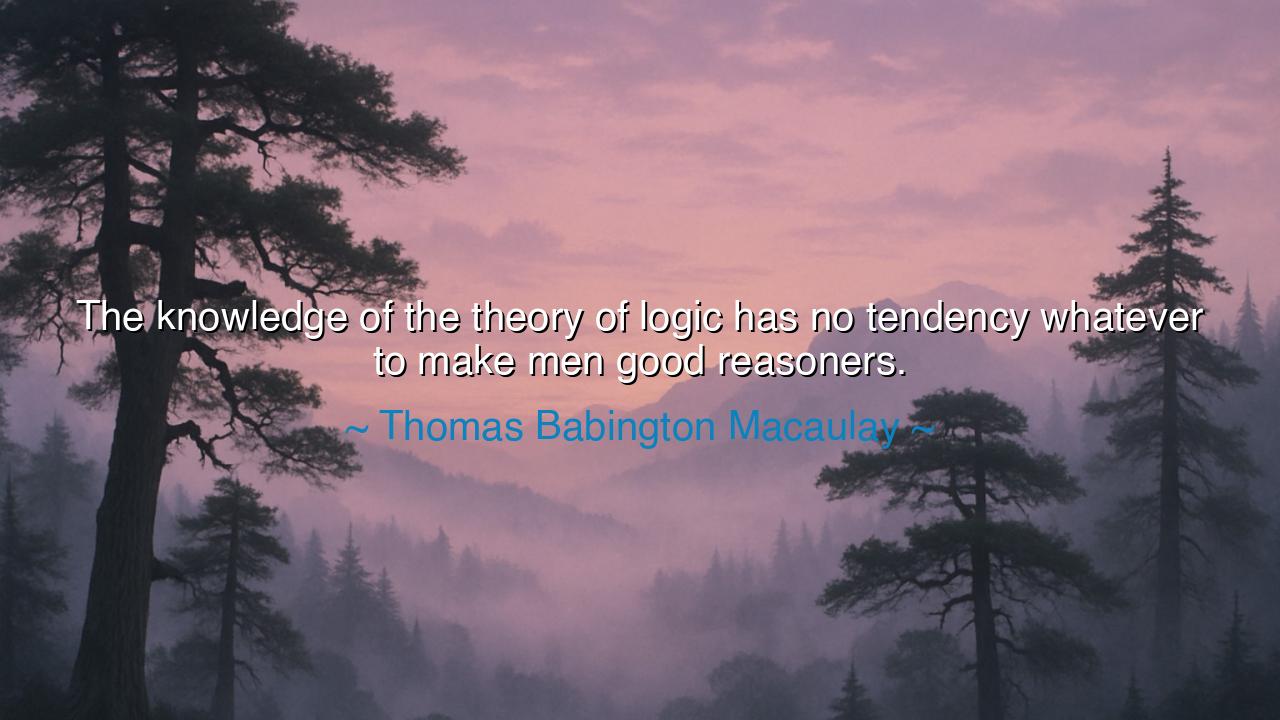
The knowledge of the theory of logic has no tendency whatever to
The knowledge of the theory of logic has no tendency whatever to make men good reasoners.






“The knowledge of the theory of logic has no tendency whatever to make men good reasoners.” Thus spoke Thomas Babington Macaulay, the historian, orator, and statesman, whose pen burned with both intellect and irony. In this single sentence, he exposes a timeless paradox: that knowing is not the same as understanding, and that the mastery of rules does not guarantee the mastery of reason. He warns us that logic, when confined to theory, is a lifeless thing — a skeleton without breath, a map studied by one who never sets foot upon the road.
Macaulay, who lived in the nineteenth century — an age swollen with scholarship and debate — saw with piercing clarity that intellectual pride is the enemy of true wisdom. Men of his time studied the theory of logic, the patterns of syllogisms and deductions, and believed themselves masters of reason. Yet in the heat of judgment, they stumbled; in the face of truth, they faltered. For reasoning is not the memorization of forms, but the living art of thought — shaped by humility, strengthened by experience, and guided by sincerity. The mind that knows how to argue may still fail to discern why or when to argue.
This truth, my friends, is as old as philosophy itself. Recall Socrates, who walked the streets of Athens not with scrolls of theory, but with questions upon his lips. He confounded the scholars of his day, not by greater learning, but by greater clarity of soul. The sophists could recite the laws of argument, but they reasoned only to win, not to understand. Socrates, though he claimed to know nothing, possessed that rare and sacred faculty — to see truth even through the fog of words. He was a good reasoner, not because he had studied logic, but because he had learned honesty of thought.
Macaulay’s warning resounds across the ages: that knowledge without wisdom is a perilous gift. Many have learned to twist truth with eloquence, to justify folly with logic’s precision. The tyrant, the demagogue, the zealot — all have used reason’s tools to disguise unreason. The danger lies not in logic itself, but in mistaking the instrument for the insight. A blade can carve or destroy; the mind can illuminate or deceive. To reason well is not to know how to argue, but to seek truth above victory, clarity above vanity, and justice above pride.
Consider the tale of Galileo Galilei, who stood before the tribunal of ignorance armed not with passion but with proof. His accusers, though educated in the logic of Aristotle, clung to dogma and rejected evidence. They were men trained in logic, yet poor reasoners, because their reasoning served not truth but fear. Galileo, a man of vision and humility, saw the greater logic — that the universe itself speaks in reason, and that to deny its voice is the greatest irrationality of all. Thus history vindicated him, and the world learned again that theory without openness of mind is but vanity in disguise.
The lesson, then, is not to despise logic, but to marry it to wisdom. Study its forms, yes — but let them be servants, not masters. Practice reasoning not only with the intellect but with the heart. Learn to listen before you speak, to question before you conclude, to admit ignorance before you pretend to certainty. For the good reasoner is not he who always triumphs in debate, but he who, through reason, becomes more just, more patient, more humane.
So, my listener, take heed of Macaulay’s wisdom: do not confuse the knowledge of logic with the power of reason. The former fills the mind; the latter enlightens the soul. Let your reasoning be guided not only by method but by moral clarity. Think not to conquer others with words, but to conquer error within yourself. For in that humble pursuit — the union of thought and virtue — lies the true mastery of reason, the wisdom that no theory alone can teach.
And thus we see: the theory of logic may polish the mind, but only truth and sincerity can make it shine. Seek them both, and your reason will not merely argue — it will illuminate.






AAdministratorAdministrator
Welcome, honored guests. Please leave a comment, we will respond soon